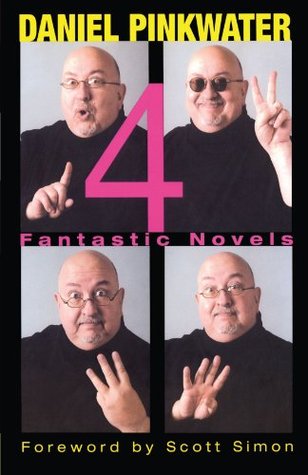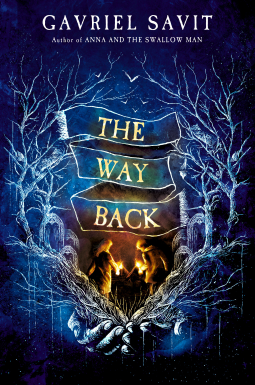[button color=”black” size=”big” link=”http://affiliates.abebooks.com/c/99844/77798/2029?u=http%3A%2F%2Fwww.abebooks.com%2Fservlet%2FSearchResults%3Fisbn%3D9780689834882″ target=”blank” ]Purchase here[/button]
There is no denying that Daniel Pinkwater is, well, goofy. Thats the word NPR journalist Scott Simon uses in his foreword to this collection of four rib-tickling, thought-provoking, all-around-entertaining short novels by the author of The Hoboken Chicken Emergency.
Most of Pinkwater’s books have several things in common. First, they all seem to have chickens in them or people dressed as chickens. Second, one or more tall, fat men (rather like the picture of Pinkwater on the jacket of this book) appear in them, often as figures of mystery or menace, but sometimes also as an endearing character. Third, junk food is a major preoccupation. But most fortunate of all is the fourth major similarity between all these books: the narrator is always a kid who embraces weirdness, who describes the most alarmingly wacky person you can imagine and then says, I liked him.
The first novel in this tall, chubby book is called Borgel. Its about a boy and the eccentric old man who claims to be a relative, and who lives with the boys family even though they arent sure HOW hes related. Together with an obnoxious talking dog named Fafner, Melvin and Borgel travel through space, time, and the other thing in a beat-up old car, visiting strange aliens, crummy worlds where dead skunks are worth a fortune, the outskirts of hell, and (finally) a mysterious island where a divine emanation resembling a Great Popsicle cavorts and dwells. I cant say I agree with Borgels theology, but on the other hand, I cant argue with a book that explains that time is like a map of New Jersey, and space is like an elliptical bagel with poppy seeds.
Next comes Yobgorgle: Mystery Monster of Lake Ontario, which deliciously unsprings the atmosphere of romantic mystery surrounding the Loch Ness monster. Clearly, if Nessie lived in a place as ordinary as Lake Ontario, she would be a very different creature and those searching for her might include a junk food enthusiast, an eccentric used car salesman, a quack scientist, and a boy who goes along because he is good at embracing weirdness. Throw in a character who seems to be equal parts Captain Nemo and Flying Dutchman…did I mention the word goofy yet?
The third novel is The Worms of Kukumlima, a mystical African safari featuring, guess who, a boy who embraces weirdness and a bunch of weird adults who appreciate him for it. For their summer vacation, they go in search of a mysterious place in deepest, darkest Africa, a place that can only be found when youre not trying to find it (or anything else in particular). And for what? To converse with a giant earthworm that knows how to play chess. Best paragraph in the book:
Ali Tabu wandered off to make coffee. He was talking to himself. Mr. Whillikers is alive! I am vindicated. I will take him back to Nairobi and show him to my boss. I have found my client. He did not die. My bad luck is over. People will no longer make fun of me. Now, no one will say that my shoes are cursed. Ali Tabu tripped over a root and fell flat on his face. I am a fortunate man, he muttered.
Finally, there is The Snarkout Boys & the Baconburg Horror, featuring many of the zany characters from The Snarkout Boys and the Avocado of Death. This time, the mismatched trio of teenagers who often sneak out to catch late night, classic movies at the Snark Theatre, are caught up in a mystery that involves a spiritual adviser named the Honorable Lama Lumpo Smythe-Finkel, a beat poet named Jonathan Quicksilver, a drive-in movie theatre that burns down every night, a possible werewolf, and the worlds greatest master criminal duking it out (mentally, of course) with the worlds greatest detective. Poor Walter, Winston, and Rat get a bit lost in the midst of all the zany grown-up characters and shifting points-of-view, but the best parts of the book remain the ones in which their clashing personalities make you want to blush (or maybe giggle) from a sense of familiarity.
No one turns to Daniel Pinkwater for a socially-relevant story about realistic people living realistic lives. This is good. Its nice to know you can rely on one writer to be just goofy enough, when you need something goofy to make you feel happy through and through.
Recommended Age: 10+


